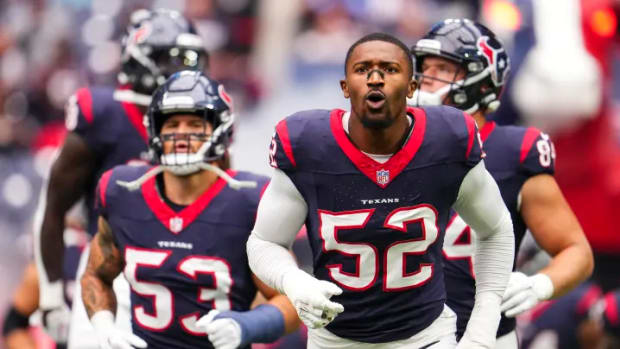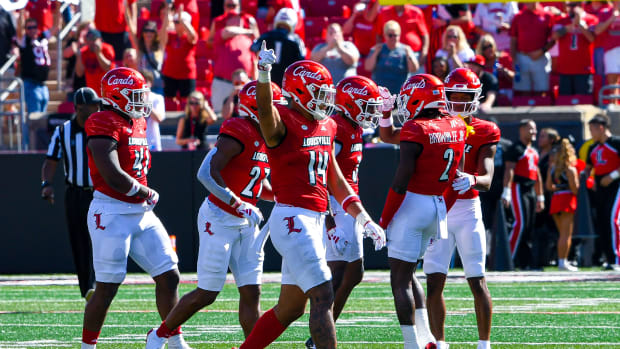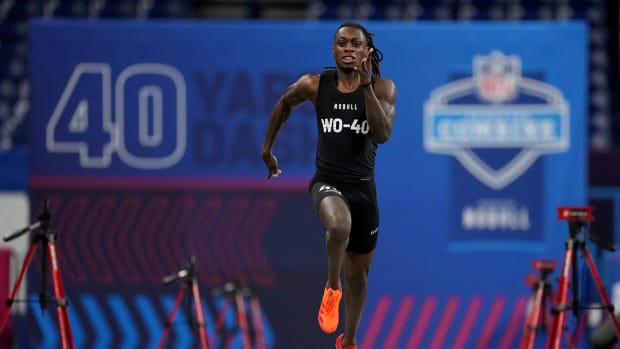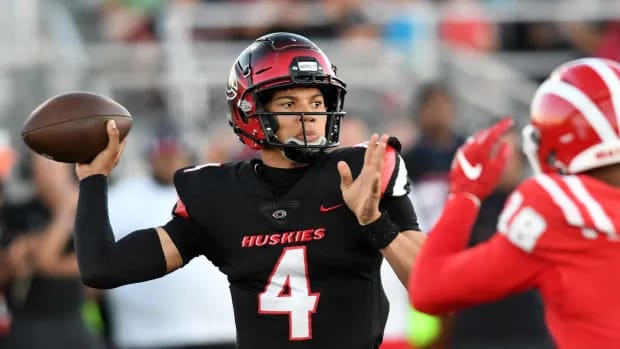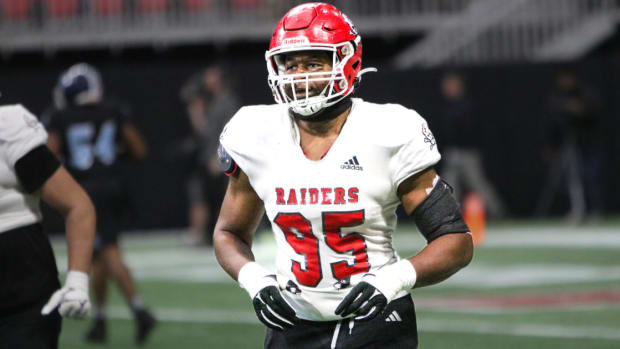Why Louisville's Run Defense Will Be Tested Against USF
LOUISVILLE, Ky. - The Jeff Scott era at USF hasn't exactly gone as well as many had hoped it would when he was hired to be their head coach prior to the 2020 season. The Bulls enter their Saturday matchup against Louisville with a 4-20 record under Scott, and the Cardinals opened up as 14-point home favorite.
That being said, there is a blueprint for a potential upset. If Louisville isn't careful, they could very well see this come to fruition. Just ask Florida, who barely escaped with a 31-28 win against USF in The Swamp.
It's not USF's defense that could carry them to victory, as they are averaging 440.0 yards and 33.7 points allowed per game so far this season - both of which rank well outside the 1op-100 in FBS. It's not their passing attack, even with a top-flight receiver in Xavier Weaver, as quarterback Gerry Bohanon has just 507 yards and four interceptions with no touchdown passes.
But, where the Bulls do excel is on the ground. They run the ball extremely well, and use it to try and control the entire flow of the game. Conversely, run defense currently is one of Louisville's biggest weaknesses as of right now.
"Yeah, they run the football. They have a really good running game," Louisville defensive coordinator Bryan Brown said. "I think they do a great job. ... they do a great job with schematics, with running some quarterback run game as well as just normal tendencies of your true zone read and things of that nature, with the backs breaking some tackles."
It all begins with Brian Battie. After just 14 yards against BYU to start the year, 5-foot-8 and 165-pound back then put up back-to-back 100-yard games, including 150 last week against Florida. He's also dangerous as a return man, as he was named a consensus All-American as a kick returner last season. He was only the second USF player to ever be named a consensus All-American, following defensive end George Selvie in 2007.
Listed at 6-foot-2 and 231-pounds, Jaren Mangham compliments Battie as the more bruising of the two, and is actually listed as their USF's starter. While he only has 102 rushing yards as opposed to Battie's 271, both have three rushing touchdowns on the year.
Then you have Bohanon. While the Baylor transfer hasn't quite gotten things going through the air like he did last season, he has made up for it by still being a dynamic runner. The 6-foot-3, 226-pound signal caller is second on the team in rushing yards with 140, and had 102 yards and touchdowns against the Gators last week.
"I think he's similar to (FSU QB) Jordan Travis in a way," Brown said. "Maybe not as fast, he's a little bit bigger. He will try to lower his shoulder on you, as opposed to some quarterbacks that may want to get down and get out of bounds. He wants to bring the boom to the defense. He's a physical runner, does a great job of keeping his eyes downfield if he does scramble to run the football."
Not to mention that USF also has a good offensive line. They're anchored by tackle Donovan Jennings and guard Demetris Harris, who were both tabbed as First-Team Preseason All-AAC selections by Pro Football Focus. So far this year, the Bulls have allowed just 0.33 sacks and 3.00 tackles for loss per game, both of which rank in the top ten in FBS.
"Their O-line is really good," head coach Scott Satterfield said. "I think probably this is the best line we've played this year, out of the first four opponents. They're athletic, they can move they get after they're aggressive."
Collectively, it produces a rushing offense that puts up 204.0 yards per game, which ranks 42nd nationally. According to PFF, the Bulls' run game has a grade of 80.2, which ranks 30th in FBS and sixth in the Group of Five.
In a vacuum, this would already be a handful for Louisville to deal with. But when you take into account how bad Louisville's rushing defense has been to start the year, it only accentuates the potential for an upset bid.
Through three games, the Cardinals are giving up an average of 201.7 rushing yards per game, which comes in at 117th nationally out of the 131 schools at the FBS level. A better way to put it is that it is the 15th-worst rushing defense, with only Colorado, South Carolina and Nebraska being Power Five schools with a worse mark.
The issue here hasn't been that Louisville is completely out of position to stop the run. In fact, their 7.7 tackles for loss per game ranks 22nd nationally and third in the ACC. The problem is that, far too often, players have been in position to make tackles and have completely whiffed due to either bad form or poor effort.
For example, Louisville has 44 missed tackles on the year according to PFF, including 12 against Florida State last week. The Seminoles were not only able tally 189 rushing yards, but broke off seven runs of more than 10 yards - including four that went for 25 yards or more. A consistant theme of those big runs were just, plain as day, missed tackles.
"We were there. I mean, everybody's seen the film. Our guys are there, and we just missed some tackles," Brown said. "We just got to pull our trigger. We're right there, just go ahead and pull your trigger. That's what we emphasized on Sunday. ... The guys, they saw it on film and they were excited that it wasn't as bad as we thought it would be schematically. It was just guys that were there, and we just we just didn't fit and make the tackle. We had a really good practice on Sunday, and we'll be ready to roll this week."
Louisville's run defense better be ready to roll against USF, because their rushing attack has the very real chance to completely dictate the game. We know this because we saw it unfold against Florida.
Not only were the Bulls able to get nearly anything they wanted on the ground, rushing for 286 yards against the Gators, but it ate up the clock severely limited the opportunities that Florida's offense had. USF was able to run 74 plays and had the ball for 36:19 of the game. By contrast, Florida only got off 48 plays and had the ball for 23:41. Had it not been for a botched snap and bad hold on USF's final drive, they could have pulled off the upset as a three-score underdog.
Considering Louisville's had offensive struggles of their own, putting up 418.7 yards per game but only coming away with 19.3 points, fewer opportunities on that side of the ball is far from what the Cardinals need. Containing the USF run game will be tantamount to a UofL win.
"When you play a team like that and its limited possessions, you have to do something when you get the ball offensively, and that therefore, again, you can't turn it over," Satterfield said. "You can't shoot yourself in the foot with a penalty. So have to make those counts because what they do offensively is a game controlling type offense where they can run it."
Kickoff between the Cardinals and the Bulls is set for Saturday, Sept. 24 at 12:00 p.m. EST.
(Photo via Jared Anderson - State of Louisville/Louisville Report)
You can follow Louisville Report for future coverage by liking us on Facebook, Twitter and Instagram:
Facebook - @LouisvilleReport
Twitter - @UofLReport
Instagram - @louisville_report
You can also follow Deputy Editor Matthew McGavic at @Matt_McGavic on Twitter
